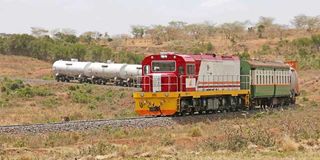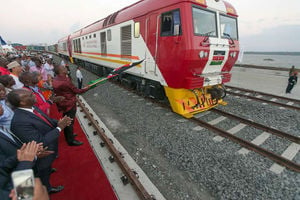
A cargo train heads to Nairobi after delivering petroleum products at Shell Vivo depot at Nanyuki town on March 3, 2022.
The Rift Valley Railways (RVR) has been sued for a possible breach of contract by two companies in what could see the taxpayer part with Sh288.84 billion in fines.
The development comes as Kenya is locked in a legal battle with KU Railways Holdings (KURH) Limited, formerly Sheltam Rail Company (PTY) Limited, and RVR Investments (RVRI) Limited over breach of contract for the construction and management of the over 100-year-old metre gauge railway.
At the centre of the court battle is a $2 billion claim by the two companies, which are suing both the Kenyan and Ugandan governments over the project linking the two countries.
Attorney-General Justin Muturi is leading the legal team representing the government during the 12-day hearing. The team includes King’s Counsel Michael Sullivan, Prof Githu Muigai and Prof Albert Mumma.
The government has submitted 12 witness statements in support of its case.
The hearings are scheduled to take place between March 4 and 9, as well as March 11.
The rail network included a main Kenya-Uganda line running from Mombasa through Nairobi, Nakuru, Eldoret, Malaba, Jinja and Kampala to Kasese in western Uganda, a distance of about 1,660 kilometres.
In 2017, the High Court ordered Kenya Railways to terminate the 25-year contract on the grounds that RVR had failed to comply with the terms of the concession agreement signed in 2006.
In terminating the concession, KR said RVR — a consortium set up to manage the railways of Kenya and Uganda — had failed to comply with three key terms of the concession agreement; namely maintenance of concessioned assets, freight volume targets and payment of concession fees.
But now the two companies have sued the governments of Kenya and Uganda as joint respondents in the case before the Permanent Court of Arbitration at the International Arbitration Centre in London, England.
The claimants are seeking an order that Kenya and Uganda compensate them up to US$2,005,900,000 for breaching the concession agreements for the project.
Various agreements
According to the case brief seen by the Nation, the plaintiffs said that between 2006 and 2011, Kenya and Uganda entered into various agreements with several companies for the construction and management of the joint Rift Valley Railways line, which was to run between the two countries for the purpose of transporting goods and passengers.
The concession agreements were signed by Kenya, through the Kenya Railway Corporation (KRC), and Uganda, through the Uganda Railway Corporation (URC).
The concession was to take effect immediately and run for a period of 25 years for freight services and five years for passenger services.
Under the concession agreement, URC and KRC were to transfer all their railway assets to RVR in return for a concession fee of 11.1 per cent of gross revenue during the concession period.
Shortly after the start of the concession, RVR was unable to secure financing from its lenders, resulting in a breach of contract.
To avoid the threat of litigation, Kenya and RVR negotiated and restructured the agreement between 2008 and 2011 to include new lenders and new timelines for achieving cargo volume targets and a payment schedule for the outstanding concession fees.
The negotiations culminated in the execution of a new Supplemental and Amendment Deed dated August 25, 2010 and a First Amendment Deed to the Direct Agreement dated August 2, 2011.
Despite the restructuring, RVR still failed to meet its contractual obligations, resulting in notices of default being issued in 2008, 2013 and 2017.
The nature of the defaults included failure to meet the investment conditions under the concession agreements, failure to achieve freight volumes and failure to pay concession fees to KRC.
In 2017, KRC issued a notice of intention to terminate the concession due to unpaid concession fees, insufficient investment and failure to achieve the contractual freight volume target.
Subsequently, the government issued a notice of termination, which was to take effect on June 30, 2017.
RVR sought court intervention and was granted an interim injunction on the condition that it pays Sh50 million by July 31, 2017.
However, RVR failed to comply with the condition and on July 31,2017 entered into a Consent Order terminating the concession. The Consent Order provided for a joint transfer of the concessioned assets between RVR and KRC.
Financial losses
“However, RVR closed its office and disappeared. It left behind several unpaid suppliers who approached KRC for payment,” the suit reads.
The two claimed that Kenya had breached the interface agreement by continuously ignoring claims of delays at the Port of Mombasa and the Malaba border.
They also claimed that Kenya had failed to protect them from the effects of the construction of the Standard Gauge Railway and had breached its obligation to indemnify RVR for financial losses caused by the SGR.
Aggrieved by the termination, the two claimants commenced arbitration proceedings against the government of Uganda, which were concluded and an award rendered last year.
The claimants stated that they had invested US$300 million in the revitalisation of the meter gauge railway.
Early last year, AG Muturi said the State was seeking to overturn rising court judgments against it, which have exceeded Sh150 billion amid mounting breaches of contract, wrongful dismissals and other litigation.
The fines are the result of historic legal disputes decided by courts and international arbitrators, some of which have been in place for more than two decades.
As a result, Mr Muturi said he was considering recommending new laws to make “reckless” government accounting officers pay the costs of unlawful decisions.








